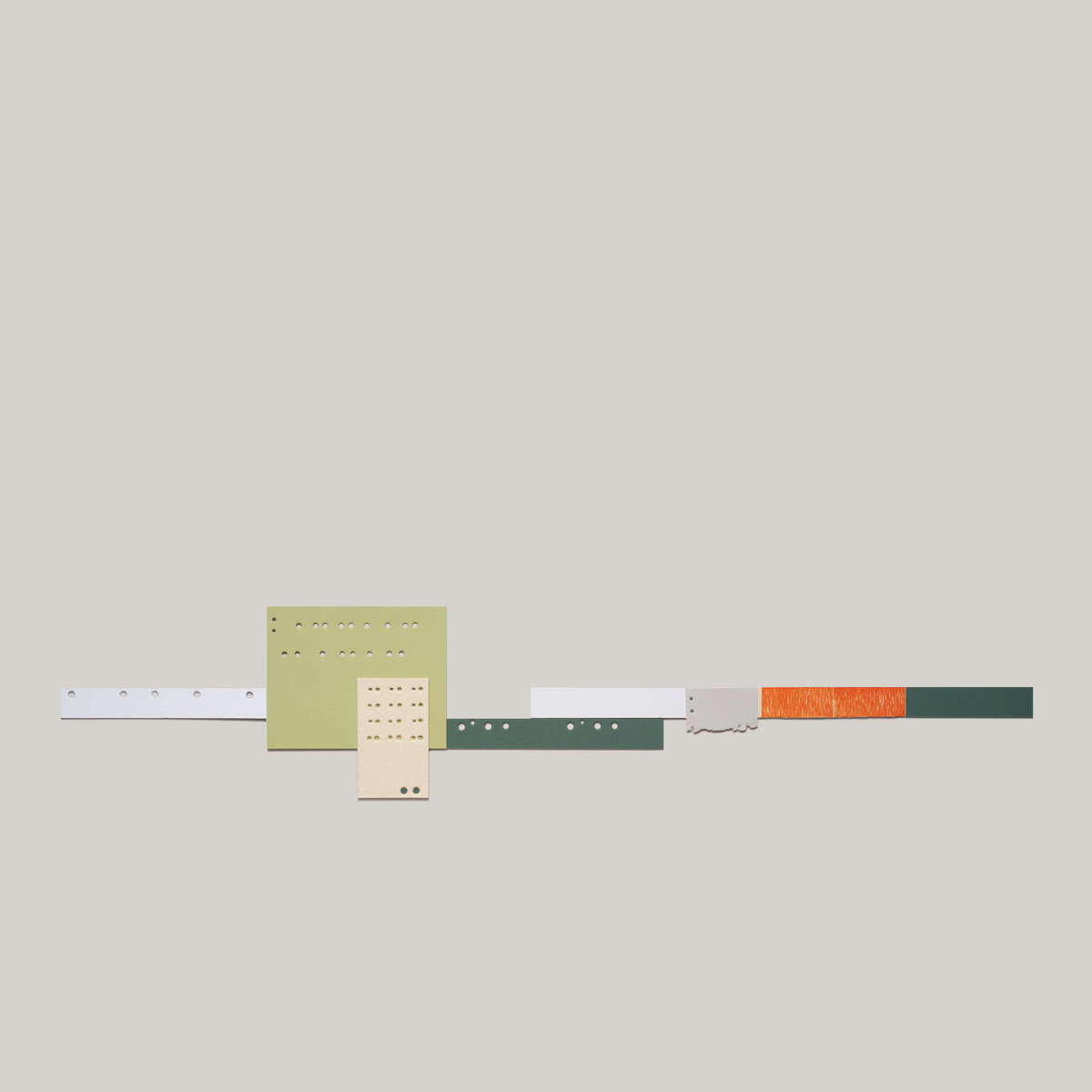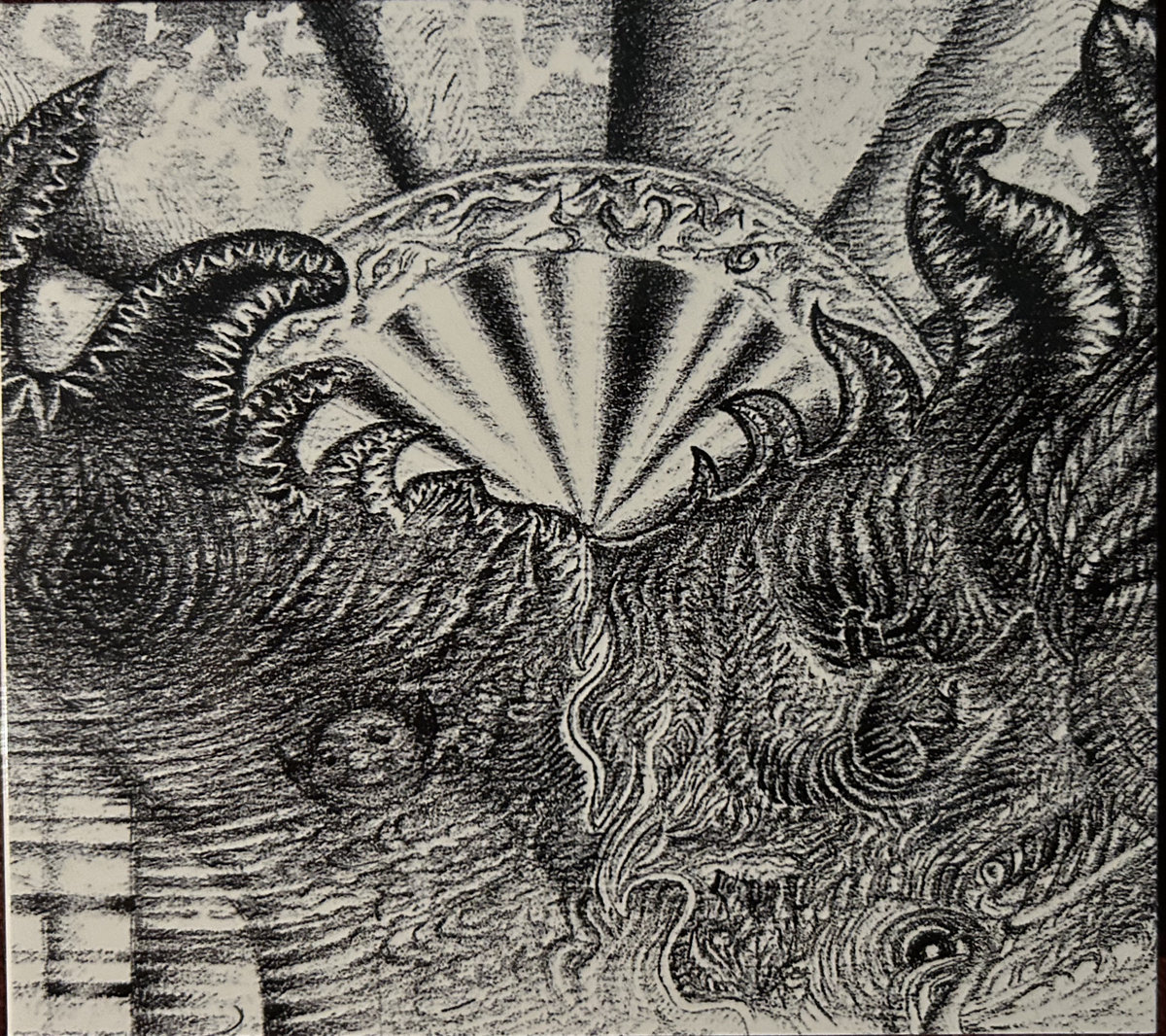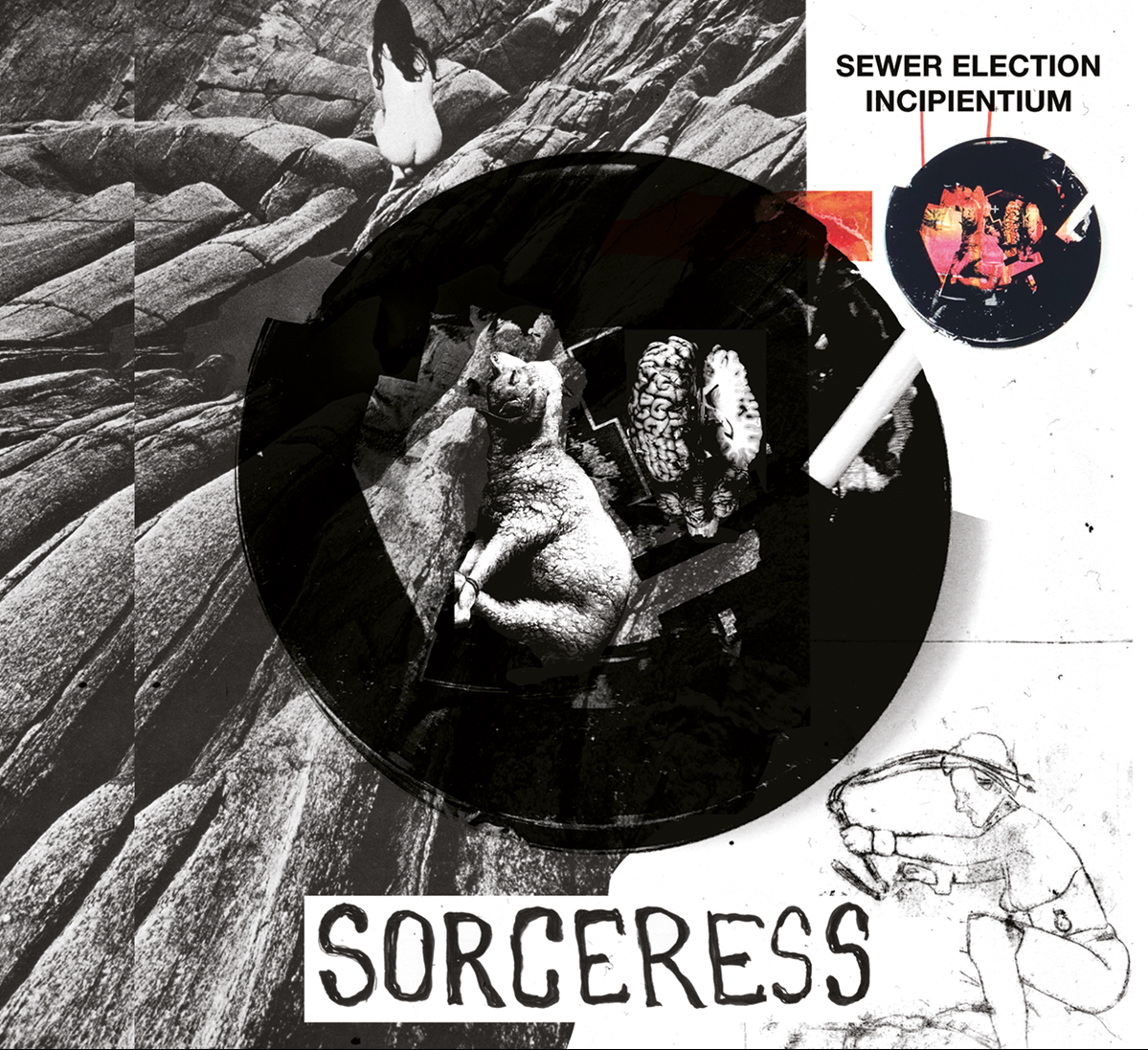- Anthony D'Amico
- Albums and Singles
 This is the vinyl debut from American Primitive-inspired French guitarist Raoul Eden, but it previously surfaced as a self-released CD back in 2023 (a previous “incarnation,” if you will). That makes the chronology of Eden’s evolution a little blurry, as his other album (Anima, released on Scissor Tail) was recorded that same year. In any case, Incarnation is an absolute tour de force, as Eden tries his damndest to fill the void left by Jack Rose’s passing and gamely spices up his “primitive psychedelic blues” vision by incorporating Indian, Arabic, Turkish, Moroccan, and Taureg influences. Obviously, the solo steel string guitarist tradition of looking to the East for cool ideas goes back to at least Robbie Basho, but Eden executes that assimilation quite beautifully (and unusually seamlessly). In fact, Eden executes just about everything beautifully and that is the bit that elevates Incarnation into something quite striking and singular, as he brings an ecstatic intensity to almost every single one of these six pieces, resulting in a strain of fingerstyle guitar that often gloriously feels like a runaway train leaving a rain of sparks in its wake.
This is the vinyl debut from American Primitive-inspired French guitarist Raoul Eden, but it previously surfaced as a self-released CD back in 2023 (a previous “incarnation,” if you will). That makes the chronology of Eden’s evolution a little blurry, as his other album (Anima, released on Scissor Tail) was recorded that same year. In any case, Incarnation is an absolute tour de force, as Eden tries his damndest to fill the void left by Jack Rose’s passing and gamely spices up his “primitive psychedelic blues” vision by incorporating Indian, Arabic, Turkish, Moroccan, and Taureg influences. Obviously, the solo steel string guitarist tradition of looking to the East for cool ideas goes back to at least Robbie Basho, but Eden executes that assimilation quite beautifully (and unusually seamlessly). In fact, Eden executes just about everything beautifully and that is the bit that elevates Incarnation into something quite striking and singular, as he brings an ecstatic intensity to almost every single one of these six pieces, resulting in a strain of fingerstyle guitar that often gloriously feels like a runaway train leaving a rain of sparks in its wake.
- Anthony D'Amico
- Albums and Singles
 This latest full-length from Australian composer Madeleine Cocolas is billed as a companion piece to 2022’s acclaimed Spectral, as the two albums have something of a conceptual yin/yang relationship: Spectral was devoted to “evoking memories and emotions,” while Bodies “is about being present in your body.” The title also has a dual meaning this time around, as Cocolas sought to explore “similarities between bodies of water and human bodies” and “blur the boundaries between them.” As is the case with most conceptual inspirations behind instrumental albums, it is hard to say how much of that actually comes through in the music, but it makes for interesting contextual background and it seems to have triggered a significant creative evolution, as Madeleine makes beautiful use of manipulated field recordings. That element alone is enough to set her apart from other ambient/drone artists in the Room40 milieu, but I was also struck by her talents for sound design and virtuosic ability to interweave countless moving parts in dynamically compelling ways. At its best, Bodies feels like a minor deep listening/headphone masterpiece.
This latest full-length from Australian composer Madeleine Cocolas is billed as a companion piece to 2022’s acclaimed Spectral, as the two albums have something of a conceptual yin/yang relationship: Spectral was devoted to “evoking memories and emotions,” while Bodies “is about being present in your body.” The title also has a dual meaning this time around, as Cocolas sought to explore “similarities between bodies of water and human bodies” and “blur the boundaries between them.” As is the case with most conceptual inspirations behind instrumental albums, it is hard to say how much of that actually comes through in the music, but it makes for interesting contextual background and it seems to have triggered a significant creative evolution, as Madeleine makes beautiful use of manipulated field recordings. That element alone is enough to set her apart from other ambient/drone artists in the Room40 milieu, but I was also struck by her talents for sound design and virtuosic ability to interweave countless moving parts in dynamically compelling ways. At its best, Bodies feels like a minor deep listening/headphone masterpiece.
- Anthony D'Amico
- Albums and Singles
 After teasingly releasing a pair of soundtracks under his given name, Adam Wiltzie's latest solo album marks a return (of sorts) to the ambient/drone terrain of his beloved former duo with the late Brian McBride (Stars of the Lid). Unsurprisingly, the titular barbiturate/anesthetic deserves some credit for inspiring this shift in direction, as Wiltzie sometimes yearns for a "sacred escape" from the "daily emotional meat grinder of life," but the album also drew inspiration from his recent move to the Flemish countryside and a recurring dream ("if someone listened to the music I created, then they would die"). Based on my own listening experience, I can tentatively say that the album is probably not lethal (outside of dreams, at least) and also that it will presumably delight those Wiltzie fans who have been patiently longing for such a "return to form." That said, Wiltzie's vision is characteristically a bit of an understated one, so the pleasures of Eleven Fugues for Sodium Pentothal tend to be subtle, ephemeral, and sneakily slow-burning ones.
After teasingly releasing a pair of soundtracks under his given name, Adam Wiltzie's latest solo album marks a return (of sorts) to the ambient/drone terrain of his beloved former duo with the late Brian McBride (Stars of the Lid). Unsurprisingly, the titular barbiturate/anesthetic deserves some credit for inspiring this shift in direction, as Wiltzie sometimes yearns for a "sacred escape" from the "daily emotional meat grinder of life," but the album also drew inspiration from his recent move to the Flemish countryside and a recurring dream ("if someone listened to the music I created, then they would die"). Based on my own listening experience, I can tentatively say that the album is probably not lethal (outside of dreams, at least) and also that it will presumably delight those Wiltzie fans who have been patiently longing for such a "return to form." That said, Wiltzie's vision is characteristically a bit of an understated one, so the pleasures of Eleven Fugues for Sodium Pentothal tend to be subtle, ephemeral, and sneakily slow-burning ones.
- Anthony D'Amico
- Albums and Singles
 My familiarity with James Vella is primarily through his role running the excellent Phantom Limb label, but that is just one facet of a varied career, as he is also a fiction writer and a member of the Canterbury-based post-rock ensemble Yndi Halda. He records as a solo artist too and has been sporadically releasing albums as A Lily for almost two decades now. Notably, Vella is also of Maltese descent, which inspired this wonderful stylistic detour: Saru l-Qamar is assembled from tapes of home recordings archived by the Maltese heritage organization Magna Żmien. Naturally, that made my ears perk up immediately, as I often enjoy the crackling and hissing escapism of dispatches from long-dead people in far-flung places, but the “oneiric bliss” of Vella’s achingly beautiful and hallucinatory collages proved to be an unexpected and welcome enhancement. This is one of my favorite albums of the year thus far.
My familiarity with James Vella is primarily through his role running the excellent Phantom Limb label, but that is just one facet of a varied career, as he is also a fiction writer and a member of the Canterbury-based post-rock ensemble Yndi Halda. He records as a solo artist too and has been sporadically releasing albums as A Lily for almost two decades now. Notably, Vella is also of Maltese descent, which inspired this wonderful stylistic detour: Saru l-Qamar is assembled from tapes of home recordings archived by the Maltese heritage organization Magna Żmien. Naturally, that made my ears perk up immediately, as I often enjoy the crackling and hissing escapism of dispatches from long-dead people in far-flung places, but the “oneiric bliss” of Vella’s achingly beautiful and hallucinatory collages proved to be an unexpected and welcome enhancement. This is one of my favorite albums of the year thus far.
- Anthony D'Amico
- Albums and Singles
 My familiarity with James Vella is primarily through his role running the excellent Phantom Limb label, but that is just one facet of a varied career, as he is also a fiction writer and a member of the Canterbury-based post-rock ensemble Yndi Halda. He records as a solo artist too and has been sporadically releasing albums as A Lily for almost two decades now. Notably, Vella is also of Maltese descent, which inspired this wonderful stylistic detour: Saru l-Qamar is assembled from tapes of home recordings archived by the Maltese heritage organization Magna Żmien. Naturally, that made my ears perk up immediately, as I often enjoy the crackling and hissing escapism of dispatches from long-dead people in far-flung places, but the “oneiric bliss” of Vella’s achingly beautiful and hallucinatory collages proved to be an unexpected and welcome enhancement. This is one of my favorite albums of the year thus far.
My familiarity with James Vella is primarily through his role running the excellent Phantom Limb label, but that is just one facet of a varied career, as he is also a fiction writer and a member of the Canterbury-based post-rock ensemble Yndi Halda. He records as a solo artist too and has been sporadically releasing albums as A Lily for almost two decades now. Notably, Vella is also of Maltese descent, which inspired this wonderful stylistic detour: Saru l-Qamar is assembled from tapes of home recordings archived by the Maltese heritage organization Magna Żmien. Naturally, that made my ears perk up immediately, as I often enjoy the crackling and hissing escapism of dispatches from long-dead people in far-flung places, but the “oneiric bliss” of Vella’s achingly beautiful and hallucinatory collages proved to be an unexpected and welcome enhancement. This is one of my favorite albums of the year thus far.
- Anthony D'Amico
- Albums and Singles
 I had a roommate back in the '90s who was deeply into the ambient side of techno, which was something that I intensely loathed at the time. Unbeknownst to me, however, that was my first exposure to the seemingly ubiquitous and eternal Taylor Deupree (via his Human Mesh Dance and Prototype 909 projects). I have since grown to genuinely love his work, of course, but I am sufficiently guilty of taking him for granted that I slept on his landmark 2002 album Stil. The same is not true of Joseph Branciforte (who runs the greyfade label), as he was so taken with the album that he embarked upon a multi-year project to "bring Deupree's explorations of extreme repetition and stillness into the world of notated chamber music." That initially seemed like quite a quixotic endeavor to me, but the resultant album is an absolute revelation, as breaking Deupree's elegantly skipping and sublime ambient magic up into individual acoustic components reveals an incredible degree of harmonic and dynamic sophistication that would have been otherwise lost on me. To paraphrase a scene from Mad Men, hearing Sti.ll after listening to Stil. feels like the moment in The Wizard of Oz when everything unexpectedly bursts into vivid color.
I had a roommate back in the '90s who was deeply into the ambient side of techno, which was something that I intensely loathed at the time. Unbeknownst to me, however, that was my first exposure to the seemingly ubiquitous and eternal Taylor Deupree (via his Human Mesh Dance and Prototype 909 projects). I have since grown to genuinely love his work, of course, but I am sufficiently guilty of taking him for granted that I slept on his landmark 2002 album Stil. The same is not true of Joseph Branciforte (who runs the greyfade label), as he was so taken with the album that he embarked upon a multi-year project to "bring Deupree's explorations of extreme repetition and stillness into the world of notated chamber music." That initially seemed like quite a quixotic endeavor to me, but the resultant album is an absolute revelation, as breaking Deupree's elegantly skipping and sublime ambient magic up into individual acoustic components reveals an incredible degree of harmonic and dynamic sophistication that would have been otherwise lost on me. To paraphrase a scene from Mad Men, hearing Sti.ll after listening to Stil. feels like the moment in The Wizard of Oz when everything unexpectedly bursts into vivid color.
- Anthony D'Amico
- Albums and Singles
 The enigmatic, inscrutable, and defunct Austrian duo of Jürgen Weber and Lili Novy/Frl. Tost has long been a subject of fascination for me, as I have had a bunch of their albums for years and enjoyed them, yet knew virtually nothing about them at all. In fact, I still would find it incredibly challenging to even answer a simple question like "what does Nový Svět sound like?" as their elusive discography continually blurs the lines between industrial, folk, cabaret, improv, collage, and whatever other esoteric influences they decided to assimilate for a given album. Amusingly, they also had a quixotic tendency to record albums in languages other than their native German, as evidenced by this newly released album from the vaults, which was originally intended to complete a "Spanish trilogy" back in 2007. In characteristically contrarian and mystifying fashion, it was shelved for being "too Spanish" and a synth album (Todas Las Últimas Cosas) was released instead. If this were any other band, I would drive myself crazy wondering why they would allow such an mesmerizing and wonderfully weird album to languish unheard, but baffling choices were basically the norm for Nový Svět. In any case, this album rules and I am thrilled to finally get to hear it.
The enigmatic, inscrutable, and defunct Austrian duo of Jürgen Weber and Lili Novy/Frl. Tost has long been a subject of fascination for me, as I have had a bunch of their albums for years and enjoyed them, yet knew virtually nothing about them at all. In fact, I still would find it incredibly challenging to even answer a simple question like "what does Nový Svět sound like?" as their elusive discography continually blurs the lines between industrial, folk, cabaret, improv, collage, and whatever other esoteric influences they decided to assimilate for a given album. Amusingly, they also had a quixotic tendency to record albums in languages other than their native German, as evidenced by this newly released album from the vaults, which was originally intended to complete a "Spanish trilogy" back in 2007. In characteristically contrarian and mystifying fashion, it was shelved for being "too Spanish" and a synth album (Todas Las Últimas Cosas) was released instead. If this were any other band, I would drive myself crazy wondering why they would allow such an mesmerizing and wonderfully weird album to languish unheard, but baffling choices were basically the norm for Nový Svět. In any case, this album rules and I am thrilled to finally get to hear it.
- Creaig Dunton
- Albums and Singles
 First issued in 2013 as a limited-to-50 CDr, the, um, second album by the duo of Christoph Heemann and Will Long (Celer) was initially released in conjunction with a tour and has been only digitally available since. For its tenth anniversary, Black Rose Recordings have reissued this second (of three) recordings from the project on a wider available physical edition, ensuring that its lush, yet sparse collection of electronics are available once again for those longing for a tangible copy.
First issued in 2013 as a limited-to-50 CDr, the, um, second album by the duo of Christoph Heemann and Will Long (Celer) was initially released in conjunction with a tour and has been only digitally available since. For its tenth anniversary, Black Rose Recordings have reissued this second (of three) recordings from the project on a wider available physical edition, ensuring that its lush, yet sparse collection of electronics are available once again for those longing for a tangible copy.
- Creaig Dunton
- Albums and Singles
 A pairing of two Swedish artists, the veteran Dan Johansson (Sewer Election) and the relative newcomer Gustav Danielsbacka (Incipientium), Sorceress makes for an unsettling collaboration at various points throughout its four compositions. With their heavy use of manipulated tapes, they add an uncomfortably organic sense to the sputtering electronics and junk noise that sound anything but human throughout. It may be unsettling, but it is also delightfully enchanting throughout.
A pairing of two Swedish artists, the veteran Dan Johansson (Sewer Election) and the relative newcomer Gustav Danielsbacka (Incipientium), Sorceress makes for an unsettling collaboration at various points throughout its four compositions. With their heavy use of manipulated tapes, they add an uncomfortably organic sense to the sputtering electronics and junk noise that sound anything but human throughout. It may be unsettling, but it is also delightfully enchanting throughout.
- Anthony D'Amico
- Albums and Singles
 This unusual drum and guitar duo first surfaced back in the dark days of early 2020 with The Quickening, which they boldly recorded without ever having previously performed together. Obviously, both artists are seasoned improvisers and excellent musicians, but I was still taken aback by the instant and incredible chemistry on pieces like that album's title track. Given the significant hurdles like distance, touring schedules, and other collaborations, it understandably took quite some time before the opportunity to reconvene presented itself, but the duo finally managed to meet up in White's native Australia in 2022 for some recording sessions in the coastal town of Point Lonsdale. The resultant album feels a bit different from its predecessor for a couple of reasons (no acoustic guitars this time around, "big change of vibe and scenery"), but the three-part "Bitterroot Valley Suite" beautifully recaptures the magic and spontaneity of the pair's debut while also breaking some very compelling new ground.
This unusual drum and guitar duo first surfaced back in the dark days of early 2020 with The Quickening, which they boldly recorded without ever having previously performed together. Obviously, both artists are seasoned improvisers and excellent musicians, but I was still taken aback by the instant and incredible chemistry on pieces like that album's title track. Given the significant hurdles like distance, touring schedules, and other collaborations, it understandably took quite some time before the opportunity to reconvene presented itself, but the duo finally managed to meet up in White's native Australia in 2022 for some recording sessions in the coastal town of Point Lonsdale. The resultant album feels a bit different from its predecessor for a couple of reasons (no acoustic guitars this time around, "big change of vibe and scenery"), but the three-part "Bitterroot Valley Suite" beautifully recaptures the magic and spontaneity of the pair's debut while also breaking some very compelling new ground.
- Anthony D'Amico
- Albums and Singles
 Despite her slim discography, Montreal-based Myriam Gendron has quietly amassed a very passionate following over the last few years, which is quite an impressive feat given that she frequently sings in French and the bulk of her previous oeuvre was devoted to interpretations of French/Québécois traditional music or Dorothy Parker poems. Obviously, such fare is quite far from the zeitgeist of the present time, but that is a big part of Gendron's allure: her work taps into a deeper and more timeless vein that captures the joy and pain of being alive in an unusually profound and direct way. Those same themes unsurprisingly remain central on Mayday (it was assembled in the wake of her mother's passing), but this third album is Gendron's first to focus primarily on her own original compositions as well as her first release to be professionally recorded in an actual studio. To celebrate that auspicious occasion, Gendron is joined by a host of talented collaborators like Dirty Three's Jim White, Body/Head's Bill Nace, and Marisa Anderson. Characteristically, the result is yet another absolutely mesmerizing Myriam Gendron album.
Despite her slim discography, Montreal-based Myriam Gendron has quietly amassed a very passionate following over the last few years, which is quite an impressive feat given that she frequently sings in French and the bulk of her previous oeuvre was devoted to interpretations of French/Québécois traditional music or Dorothy Parker poems. Obviously, such fare is quite far from the zeitgeist of the present time, but that is a big part of Gendron's allure: her work taps into a deeper and more timeless vein that captures the joy and pain of being alive in an unusually profound and direct way. Those same themes unsurprisingly remain central on Mayday (it was assembled in the wake of her mother's passing), but this third album is Gendron's first to focus primarily on her own original compositions as well as her first release to be professionally recorded in an actual studio. To celebrate that auspicious occasion, Gendron is joined by a host of talented collaborators like Dirty Three's Jim White, Body/Head's Bill Nace, and Marisa Anderson. Characteristically, the result is yet another absolutely mesmerizing Myriam Gendron album.